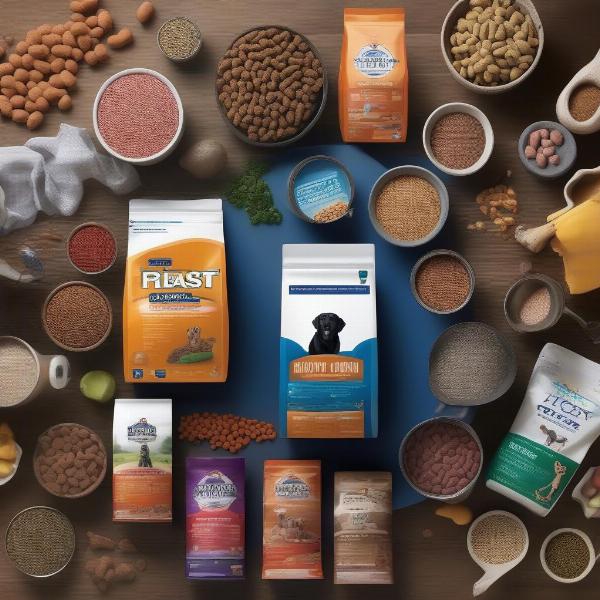Finding a trusty dog food can feel overwhelming with so many brands and formulations available. Whether you’re a new dog owner or a seasoned pro, providing your furry friend with optimal nutrition is crucial for their overall health and well-being. This comprehensive guide will help you navigate the world of dog food, empowering you to make informed decisions and select the perfect diet for your beloved companion.
Deciphering Dog Food Labels: A Key to Trustworthy Nutrition
Understanding dog food labels is the first step towards choosing a trusty option. Look for the AAFCO (Association of American Feed Control Officials) statement, which verifies that the food meets minimum nutritional requirements. Pay close attention to the ingredient list, which is listed in descending order by weight. High-quality protein sources, such as chicken, beef, or fish, should be listed first. Avoid foods with fillers like corn, wheat, and soy, which offer little nutritional value.
Life Stage Matters: Trusty Dog Food for Puppies, Adults, and Seniors
Different life stages require different nutritional needs. Puppies need higher protein and calorie content to support their rapid growth. Adult dogs require a balanced diet to maintain their weight and energy levels. Senior dogs benefit from lower calorie, higher fiber diets to support their aging joints and digestive systems. Choosing a trusty dog food formulated specifically for your dog’s life stage is essential.
Special Needs and Trusty Dog Food: Addressing Dietary Restrictions
Does your dog have allergies or sensitivities? Many trusty dog food brands offer specialized formulations for dogs with specific dietary needs, such as grain-free, limited ingredient, and hypoallergenic options. Consult with your veterinarian to determine the best diet for your dog’s individual requirements. They can help you choose a trusty dog food that addresses these concerns without compromising nutritional value.
Beyond the Basics: Trusty Dog Food and Specific Health Concerns
Certain health conditions may benefit from specific dietary modifications. For example, dogs with joint issues may benefit from food enriched with glucosamine and chondroitin. Dogs with kidney disease may require a lower protein diet. Always consult with your veterinarian before making any significant changes to your dog’s diet, especially if they have pre-existing health conditions. They can recommend a trusty dog food that complements their treatment plan.
Budget-Friendly and Trusty: Finding Affordable Quality
Providing your dog with a trusty diet doesn’t have to break the bank. Compare prices and ingredients, and consider buying in bulk. Look for sales and coupons, and don’t be afraid to explore different brands. Remember, a higher price tag doesn’t always equate to higher quality.
 Affordable and Trusty Dog Food Options
Affordable and Trusty Dog Food Options
Conclusion: Building Trust with Your Dog’s Food
Choosing a trusty dog food requires careful consideration of your dog’s individual needs, including their age, breed, activity level, and any health concerns. By understanding dog food labels, consulting with your veterinarian, and researching different brands, you can ensure your furry friend receives the optimal nutrition they deserve. Investing in a trusty dog food is an investment in their long-term health and happiness.
FAQ:
- How do I know if my dog food is trusty? Look for the AAFCO statement, check the ingredient list, and consult with your veterinarian.
- What are some common signs of food allergies in dogs? Itching, skin irritation, gastrointestinal upset, and ear infections can be signs of food allergies.
- Is grain-free dog food always better? Not necessarily. Some dogs thrive on grain-free diets, while others do better with grains. Consult with your vet.
- How often should I change my dog’s food? Avoid frequent changes unless necessary due to allergies or other health concerns. Gradual transitions are key.
- Can I give my dog homemade food? Yes, but it’s crucial to ensure the diet is nutritionally balanced. Consult a veterinary nutritionist for guidance.
- What is the best way to store dog food? Store dry food in a cool, dry place in an airtight container. Refrigerate opened wet food.
- How much should I feed my dog? Follow the feeding guidelines on the dog food label, but adjust based on your dog’s individual needs and activity level.
Boost Your Dog’s Well-being with ILM Dog
ILM Dog (https://ilmdog.com) is your trusted partner in providing exceptional canine care. We offer expert advice on all aspects of dog ownership, from breed selection and nutrition to training and health care. Our mission is to empower dog owners with the knowledge and resources they need to ensure their beloved companions live long, healthy, and happy lives. Contact us today for personalized guidance: Email: [email protected], Phone: +44 20-3965-8624.